-
 Bitcoin
Bitcoin $114500
-0.31% -
 Ethereum
Ethereum $3648
1.11% -
 XRP
XRP $3.033
-0.27% -
 Tether USDt
Tether USDt $0.9999
-0.01% -
 BNB
BNB $758.5
-0.32% -
 Solana
Solana $167.5
1.48% -
 USDC
USDC $0.9998
-0.02% -
 TRON
TRON $0.3331
0.74% -
 Dogecoin
Dogecoin $0.2039
0.25% -
 Cardano
Cardano $0.7419
-0.46% -
 Hyperliquid
Hyperliquid $39.21
2.66% -
 Stellar
Stellar $0.4049
-1.95% -
 Sui
Sui $3.483
-0.56% -
 Bitcoin Cash
Bitcoin Cash $570.8
2.89% -
 Chainlink
Chainlink $16.67
-0.57% -
 Hedera
Hedera $0.2470
-1.57% -
 Ethena USDe
Ethena USDe $1.001
0.00% -
 Avalanche
Avalanche $22.36
1.52% -
 Litecoin
Litecoin $123.4
4.35% -
 UNUS SED LEO
UNUS SED LEO $8.989
0.09% -
 Toncoin
Toncoin $3.324
-2.40% -
 Shiba Inu
Shiba Inu $0.00001219
-1.30% -
 Uniswap
Uniswap $9.811
2.54% -
 Polkadot
Polkadot $3.662
-0.07% -
 Monero
Monero $295.5
-3.85% -
 Dai
Dai $1.000
0.01% -
 Bitget Token
Bitget Token $4.345
0.24% -
 Cronos
Cronos $0.1380
0.95% -
 Pepe
Pepe $0.00001044
-1.14% -
 Ethena
Ethena $0.5981
-4.24%
How to calculate BitMart’s margin handling fee?
Understanding BitMart's margin handling fee structure, comprising a fixed handling fee (0.03% of position value) and a variable interest rate, is crucial for effective margin trading.
Nov 27, 2024 at 07:20 am
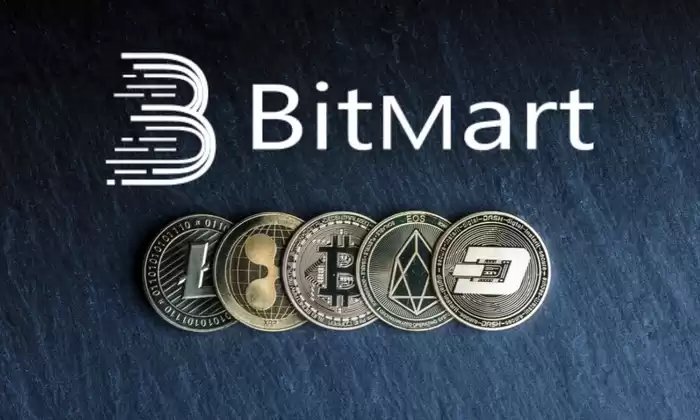
How to Calculate BitMart's Margin Handling Fee?
BitMart, a leading cryptocurrency derivatives trading platform, charges a margin handling fee for leveraging positions. Understanding how to calculate this fee is crucial to manage your trading costs effectively. Here's a comprehensive guide on calculating BitMart's margin handling fee.
1. Understand Margin Trading on BitMart
Margin trading involves borrowing funds from the exchange to amplify trading positions and potentially increase returns. On BitMart, traders can leverage their positions by using a multiplier that multiplies the position size by the margin ratio.
2. Identify Margin Handling Fee Structure
BitMart's margin handling fee consists of two components: a fixed handling fee and a variable interest rate. The fixed handling fee is charged once when a position is opened, while the interest rate is charged on the borrowed amount for the duration of the position.
3. Calculate Fixed Handling Fee
The fixed handling fee is a flat rate of 0.03% of the position value at the time of opening. This fee is deducted from the trader's account before the position is executed.
For example, if you open a $10,000 BTC-USDT position, the fixed handling fee would be:
Fixed Handling Fee = 0.03% x $10,000 = $3
4. Calculate Interest Rate
The variable interest rate is based on the following factors:
- Type of margin (isolated/cross)
- Asset being traded
- Market conditions
BitMart publishes the interest rates for various assets on its website. You can check the interest rate applicable to your desired trading pair before opening a position.
5. Calculate Interest Charge
To calculate the interest charge, you need to consider the borrowed amount, interest rate, and duration of the position. The interest charge is calculated using the following formula:
Interest Charge = Borrowed Amount x Interest Rate x Duration of Position
For example, if you borrow $5,000 USDT for 24 hours with an annualized interest rate of 10%, the interest charge would be:
Interest Charge = $5,000 x 0.10 / 365 x 24 = $0.33
6. Total Margin Handling Fee
The total margin handling fee is the sum of the fixed handling fee and the interest charge.
Total Margin Handling Fee = Fixed Handling Fee + Interest Charge
In the example above, the total margin handling fee would be:
Total Margin Handling Fee = $3 + $0.33 = $3.33
7. Impact of Position Leverage
The leverage used to open a margin position significantly impacts the margin handling fee. The higher the leverage, the lower the fixed handling fee as a percentage of the position value, but the higher the interest charge.
8. Monitoring and Managing Margin Costs
It's crucial to monitor your open positions and the associated margin handling fees regularly. BitMart provides a detailed history of margin handling fees in the account activity section. By understanding the calculation process, you can optimize your margin trading strategies to minimize costs and maximize returns.
Disclaimer:info@kdj.com
The information provided is not trading advice. kdj.com does not assume any responsibility for any investments made based on the information provided in this article. Cryptocurrencies are highly volatile and it is highly recommended that you invest with caution after thorough research!
If you believe that the content used on this website infringes your copyright, please contact us immediately (info@kdj.com) and we will delete it promptly.
- Metamask, Altcoins, and the Move: Is Cold Wallet the Future?
- 2025-08-06 04:30:12
- BlockDAG, BNB, and SEI: What's Hot and What's Not in the Crypto World
- 2025-08-06 04:50:13
- Cryptos Under $1 Primed for a Bull Run: Which Will Explode?
- 2025-08-06 05:30:12
- Coinbase (COIN) Stock Trading Lower: Navigating the Crypto Equity Reset
- 2025-08-06 04:35:13
- Meme Coins Skyrocket: Is Dogecoin About to Be Dethroned?
- 2025-08-06 03:50:13
- Tether's On-Chain Surge: USDT Dominates and Drives Blockchain Fees
- 2025-08-06 02:50:13
Related knowledge
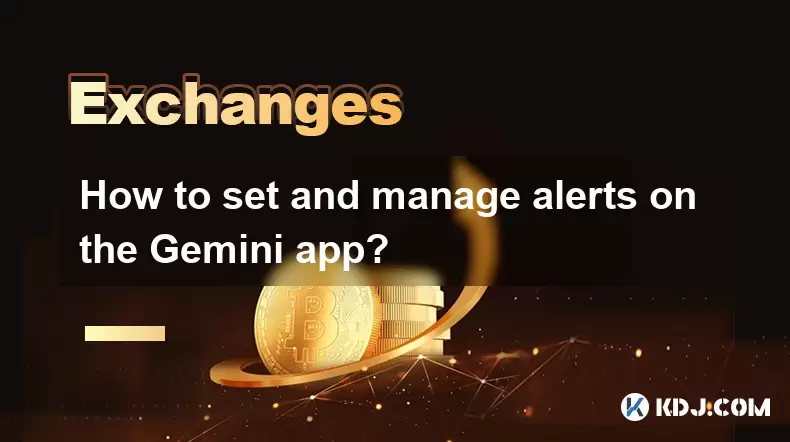
How to set and manage alerts on the Gemini app?
Aug 03,2025 at 11:00am
Understanding the Gemini App Alert SystemThe Gemini app offers users a powerful way to stay informed about their cryptocurrency holdings, price moveme...
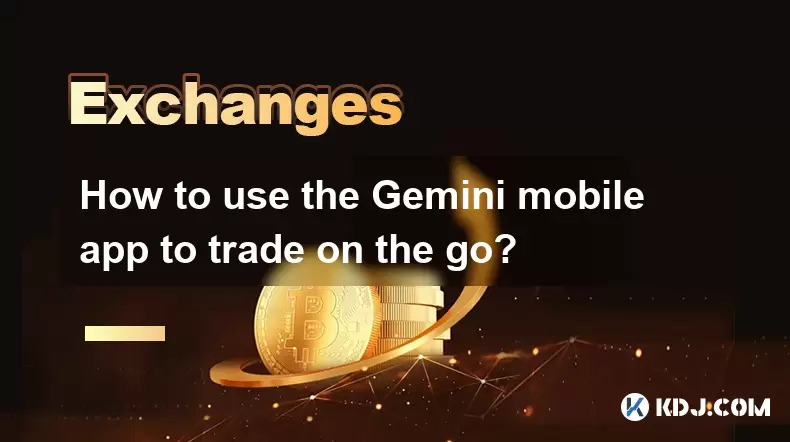
How to use the Gemini mobile app to trade on the go?
Aug 04,2025 at 09:14am
Setting Up the Gemini Mobile AppTo begin trading on the go using the Gemini mobile app, the first step is installing the application on your smartphon...
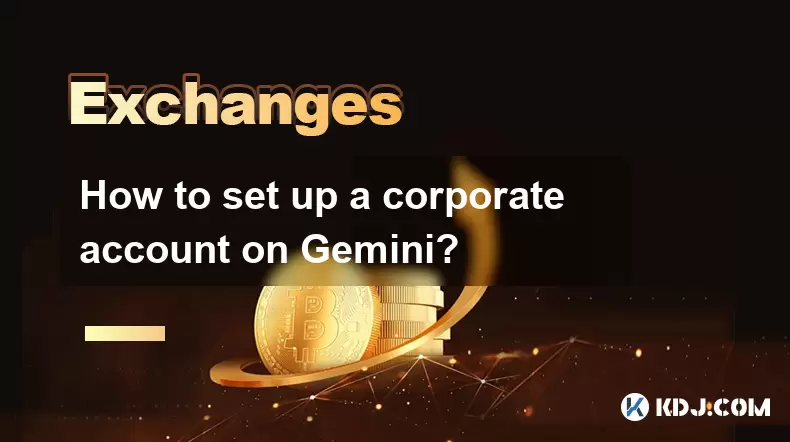
How to set up a corporate account on Gemini?
Aug 05,2025 at 03:29pm
Understanding Gemini Corporate AccountsGemini is a regulated cryptocurrency exchange platform that supports both individual and corporate account crea...
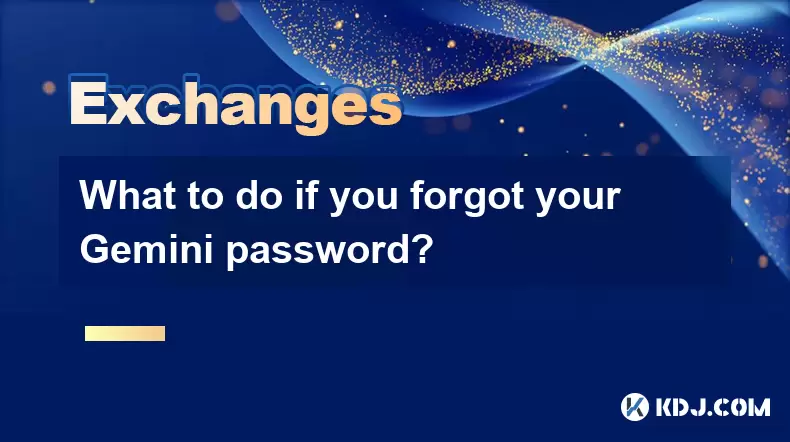
What to do if you forgot your Gemini password?
Aug 04,2025 at 03:42am
Understanding the Role of Passwords in Gemini AccountsWhen using Gemini, a regulated cryptocurrency exchange platform, your password serves as one of ...
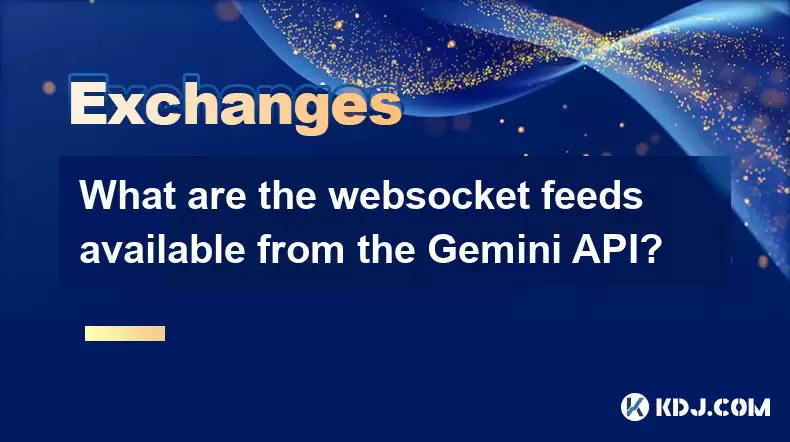
What are the websocket feeds available from the Gemini API?
Aug 03,2025 at 07:43pm
Overview of Gemini WebSocket FeedsThe Gemini API provides real-time market data through its WebSocket feeds, enabling developers and traders to receiv...
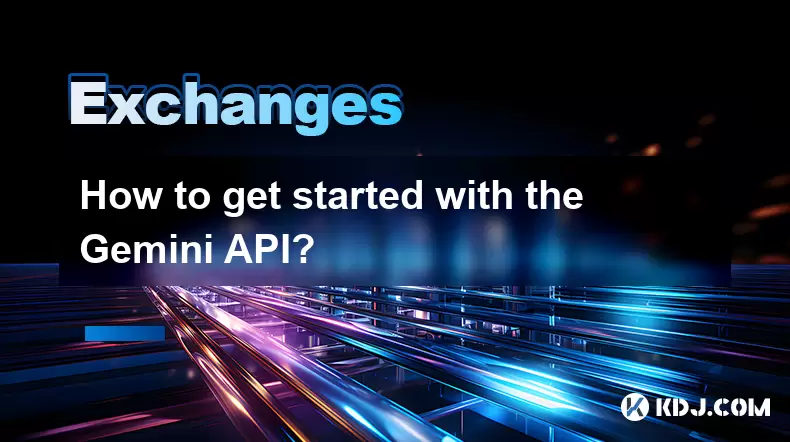
How to get started with the Gemini API?
Aug 05,2025 at 12:35pm
Understanding the Gemini API and Its PurposeThe Gemini API is a powerful interface provided by the cryptocurrency exchange Gemini, enabling developers...

How to set and manage alerts on the Gemini app?
Aug 03,2025 at 11:00am
Understanding the Gemini App Alert SystemThe Gemini app offers users a powerful way to stay informed about their cryptocurrency holdings, price moveme...

How to use the Gemini mobile app to trade on the go?
Aug 04,2025 at 09:14am
Setting Up the Gemini Mobile AppTo begin trading on the go using the Gemini mobile app, the first step is installing the application on your smartphon...

How to set up a corporate account on Gemini?
Aug 05,2025 at 03:29pm
Understanding Gemini Corporate AccountsGemini is a regulated cryptocurrency exchange platform that supports both individual and corporate account crea...

What to do if you forgot your Gemini password?
Aug 04,2025 at 03:42am
Understanding the Role of Passwords in Gemini AccountsWhen using Gemini, a regulated cryptocurrency exchange platform, your password serves as one of ...

What are the websocket feeds available from the Gemini API?
Aug 03,2025 at 07:43pm
Overview of Gemini WebSocket FeedsThe Gemini API provides real-time market data through its WebSocket feeds, enabling developers and traders to receiv...

How to get started with the Gemini API?
Aug 05,2025 at 12:35pm
Understanding the Gemini API and Its PurposeThe Gemini API is a powerful interface provided by the cryptocurrency exchange Gemini, enabling developers...
See all articles

























































































